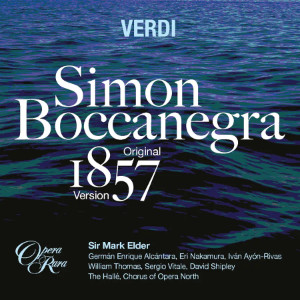
Giuseppe Verdi (1813-1901)
Simon Boccanegra (1857 version), Opera in a Prologue and 3 Acts
Simon Boccanegra: Germán Enrique Alcántara (baritone)
Amelia: Eri Nakamura (soprano)
Gabriele: Iván Ayón-Rivas (tenor)
Fiesco: William Thomas (bass)
Chorus of Opera North and Royal Northern College of Music Opera Chorus
The Hallé/Sir Mark Elder
rec. 2024, Hallé St Peter’s, Ancoats, Manchester, UK
Synopsis in English, French, German, and Italian, and libretto in Italian with English translation
Opera Rara ORC65 [2 CDs: 133]
Premiered on 12 March 1857 at Teatro la Fenice in Venice, Giuseppe Verdi’s Simon Boccanegra was not well received and, in spite of revivals in other Italian cities, did not become established in the repertoire. With the assistance of librettist Arrigo Boito, Verdi revised the opera extensively, and the second version received its first performance on 24 March 1881 at Teatro alla Scala in Milan. Recordings of the work, including the reference on Deutsche Grammophon under Claudio Abbado’s direction (1977), are usually of Verdi’s reworking.
Opera Rara presents the debut recording of a new critical edition based on Verdi’s 1857 autograph score, which reveals how the original conception departed from the conventions of Italian opera at the time. Apart from the ‘Scena e Cavatina’ for Maria Boccanegra (Amelia), which opens Act 1, the opera does not feature arias for virtuoso soloists. Moreover the romantic relationship between Amelia and Gabreiele Adorno is subordinate to the political machinations that propel Simon Boccanegra to power and, after withstanding numerous deposition attempts, lead to his death by poisoning from his favourite courtier, Paolo Albiani.
Among the most salient features not carried into the 1881 edition are the ‘Preludio’, which leads into the ‘Prologo’. This brief introduction is not far removed from the preludes to bel canto operas (e.g., Norma), and it reveals the stylistic proximity of Simon Boccanegra to Rigoletto (1851), Il trovatore (1853), and La traviata (1853). The Act 1 finale takes place at a square in Genoa, where the anniversary of Boccanegra’s coronation is being celebrated, rather than the familiar ‘Council Chamber’ scene in which the Doge forces Paolo to curse himself. In fact, Verdi altered the entire work so extensively in the 24 years separating the two versions that it is almost reasonable to speak of two operas based on the same subject. The orchestration in 1857 was less bleak than it became when Verdi made it more allusive to natural elements, especially the sea, pertinent to the story. Not only does the present recording, conducted by Mark Elder, make the original Simon Boccanegra accessible, the performance itself is riveting with idiomatic orchestral playing for the epoch of the work. Elder’s taut reading maintains dramatic tension while being flexible enough for sensitive moments, such as the scenes between Amelia and Gabriele, to make their emotional impact. The two choirs (Chorus of Opera North and Royal Northern College of Music Opera Chorus) and the soloists are absolutely committed. The jubilant massed choruses and orchestral forces in the Act 1 finale are overwhelming, albeit with a slight undertone of melancholy that adumbrates the tragedy that will soon befall the Doge, who is being lauded.
In the title role, baritone Germán Enrique Alcántara sounds ecstatic when Boccanegra is reunited with his daughter in Act 1 and dolorous as he expresses his dying wishes and blesses her marriage with Gabriele at the end of Act 3. As Amelia, the soprano Eri Nakamura depicts vulnerability in Act 1 while awaiting her beloved Gabriele and fearing that another suitor (i.e., Paolo) has intentions to marry her. Nakamura delivers the cabaletta at the end of her aria ‘Come in quest’ora bruna’ with an impressive blend of rapture and technical poise. The tenor Iván Ayón-Rivas is a tender Gabriele, whose fervent duets with Amelia reach a level of guilt-ridden torment in Act 2, Scene 9 when he discovers that she is the daughter of Boccanegra, the killer of his father. The bass William Thomas portrays an august Fiesco in the Prologue and strikes a conciliatory tone in Act 3 as he reconciles with the dying Boccanegra and learns that Amelia is his granddaughter. Baritone Sergio Vitale is a cunning Paolo, whose selfishness is apparent from his first appearance in the Prologue.
Opera Rara has provided a richly detailed recording with the feeling of a live performance that is blessedly free of audience noise and other distractions. The 136-page booklet contains the Italian libretto with an English translation, two scholarly essays, and historical illustrations. Not only does this release fill a void in the discography, it is thoroughly engrossing. A recording of the original Macbeth (1847) from Elder and this ensemble would be most welcome.
Daniel Floyd
Previous review: Philip Harrison (March 2025)
Buying this recording via a link below generates revenue for MWI, which helps the site remain free


Other cast
Paolo, Sergio Vitale (baritone)
Pietro, David Shipley (bass)
Amelia’s Maid, Beth Moxon (mezzo)
See Ralph Moore’s survey for another recommendation of the 1857 version.

















